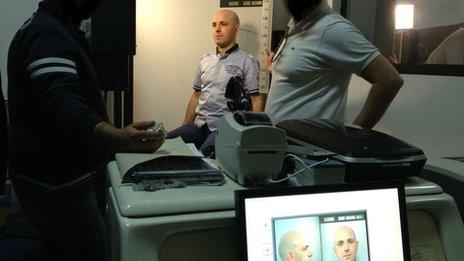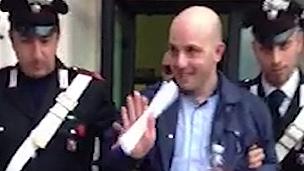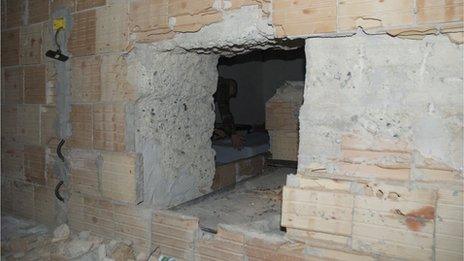Mafia boss Peppe Pesce gives himself up
- Published
Supporters and relatives turned up outside the police station
This week the boss of one of southern Italy's most powerful mafia dynasties sensationally handed himself in to police after three years on the run - and now faces 16 years in jail. The BBC was inside the police station when it happened.
At 4:15pm local time on Wednesday, 'Ndrangheta boss Giuseppe "Peppe" Pesce walked into the Carabinieri station in his native Rosarno like a man who had come to pay a parking ticket.
Freshly shaven and smiling incongruously, the mafioso - one of Calabria's most-wanted - was only a quarter of an hour late for the deadline he had set for his own surrender to the authorities.
The special Carabinieri team who had been hunting him obsessively for nearly three years looked resentful. Being denied the chance to capture him themselves seemed to have temporarily blinded them to the enormous symbolism of this criminal's public gesture.
Mafia bosses never normally turn themselves in. In extreme circumstances, if faced with certain death at the hands of their rivals or when too old or ill to survive in hiding, they may strike secret "face-saving" deals where authorities pretend to have captured them against their will.

Peppe Pesce is measured up by police after handing himself in
Instead, there he was, healthy 33-year-old Peppe Pesce. The undisputed scion of one of the supreme clans of the 'Ndrangheta, Italy's little-known but most powerful mafia organisation, amenably holding out his hands - palms up - for the black ink to be rolled over them ahead of old-fashioned fingerprinting.
The authorities had been so incredulous Pesce would turn up - as his lawyers had secretly told them he would - that no other journalists had been forewarned, in case news leaked and made him change his mind.
I was lucky to be the only one there, on a follow up trip to a BBC This World documentary on the 'Ndrangheta I had recently made with historian John Dickie. As the Pesces featured prominently in it I knew this was to be an extraordinary day in Calabria.
Empire
This was no family of mafia quitters. The Pesce are a criminal dynasty. Peppe Pesce inherited the baton of "regent" of the clan after his older brother Francesco "Ciccio" Pesce was captured in an underground bunker in 2011. Ciccio had taken the boss's mantle over from their father Antonio, as Antonio had from grandfather Don Peppino.

Pesce waves to crowds
Over half a century they had built a family empire worth at least £200m through drug trafficking across Europe, as well as extortion, violence and corruption in their own ravaged Calabrian backyard. This is the way of the 'Ndrangheta which, unlike the Sicilian Mafia, favours bloodline over merit.
From the mafioso perspective, I assumed he would be bringing the ultimate disgrace to himself and his own family. But I was wrong. As news of Peppe's appearance spread in Rosarno, the Carabinieri station turned into a pilgrimage site.
In pairs, small groups, leaning on walking sticks or carried in push-chairs, dozens and dozens of relatives and well-wishers from six months old to 90, came to pay their respects to the fallen boss.
The Carabinieri were faced with a difficult decision. Whether or not to show magnanimity to a man who had not seen his family in three years and most likely will not for many more.
Grandmother Giuseppa, fully clad in black from head to toe, was among the first to be allowed in the room where her grandchild was sitting. Covering the last tooth left in her mouth with a hand, she wept.
"Where are you going?" she asked.
"Come on, grandma. To prison, of course," he said.
"I will never see you again," she said.
"Don't worry," he said and laughed dismissively. "I'll hurry up. I have done nothing wrong. I am in the goat business."
The second, younger-looking grandmother chimed in. "Your innocence will be proved, just as Christ was resurrected," she said.

The BBC series saw police expose bunkers used as mafia hideouts
One after the other, aunts, cousins, in-laws streamed in, hugged him and kissed him. Some cried, most were jovial, a few were quick and deferential.
As Peppe became increasingly relaxed in his chair, the exercise began to look like a presidential audience of sort.
But plainclothes Carabinieri were paying close attention to each and every visitor as they filled out the gaps in their mental map of the clan. Their magnanimity suddenly made a lot more sense.
Peppe's mother and younger sister came in last. As they bawled, they were holding his three-year-old daughter. She had hardly ever seen her fugitive father and turned away from his outstretched arms.
"Is it true you don't eat much, my baby?" he asked.
"Yes," she said.
"Listen to daddy - if you don't eat, you'll never grow up," he said.
"I want to stay small," the three-year-old replied. Peppe Pesce went quiet. In a corner of the room, I had a knot in my stomach.
Nearly all of the visitors were women. Most men in the Pesce family are now behind bars.
House arrest
Only two weeks ago, in one of the most significant anti-'Ndrangheta trials to date, 42 members of the Pesce clan received a total of 500 years in jail. Peppe Pesce was sentenced to 16 years for Mafia association in absentia, which he will now begin to serve, in a high-security jail.
The net had been closing around Peppe Pesce for months as, one by one, his accomplices had been arrested. Only two weeks ago his wife, who is seven months pregnant, was put under house arrest for passing her husband's orders around.
"This is a major success for the authority of the state. But don't be fooled," said Alessandra Cerreti, who led the investigation and prosecution against the clan.
"These are never individual decisions. Usually they are clan strategies. By sacrificing one they hope to relieve the pressure we are putting on the whole organisation. But it won't work."
As Peppe Pesce was led to a car be taken to jail, the crowds had lined up along the road. He smiled and waved to his family's cheers and claps.
As the first ever 'Ndrangheta boss to surrender to the state was driven away, an old aunt cupped her hand around her mouth and yelled: "Make sure you eat well."
- Published1 May 2013
- Published15 February 2013
- Published22 January 2013